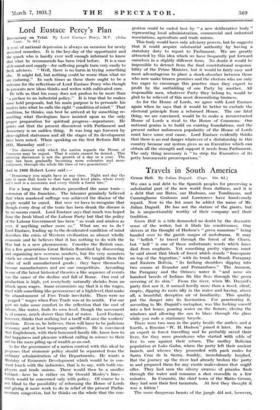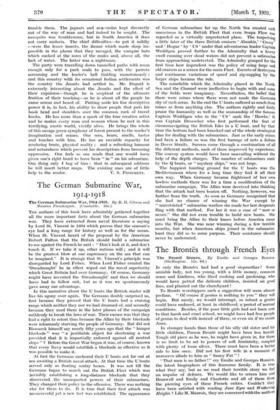Travels in South America
Green Hell. By Julian Duguid. (Cape. 10s. 6d.)
WE owe a real debt to the Spanish peoples for preserving a substantial part of the new world from dullness, and it is
a debt that our Bates,' our Hudsons, our Tomlinsons, and Cunninghame Grahams and Lawrences have handsomely repaid. Now to the list must be added the name of Mr: Julian Duguid. He has not the stature of the giants, but he is unquestionably worthy of their company and theif tradition.
Green Hell is a title demanded no doubt by the dramatic sense of the writer, but it libels his sensitiveness. One shivers at the thought of Hudson's " green mansions " being handed over to the garish usages of melodrama. It may be " hellish " to travel through the forest of the Chaco, but " hell " is one of those unfortunate words which have died from emphasis. Yet something pretty vigorous must be said about that block of forest which stands " foursquare on top of the Argentine," with its trunk in Brazil, Paraguay and Eastern Bolivia, " its farfiung shoulders dipping into two oceans at Ecuador and Pernambuco." The Amazon, the Paraguay and the Orinoco water it " and some six' hundred breeds of Indians flit like fleas through the green covering of its skin." From the river, when Mr. Du,guid's party first saw it, it seemed hardly more than a wood, silent, empty, dipping its roots idly in the water and having, above all, a beautiful, deceptive air of familiarity. This quality put the danger into its fascination. For penetrating it, according to Mr. Duguid's metaphor, was like locking oneself into a hot house, pouring water on the flowers, closing the windows and allowing the sun to blaze through the glass while you rode a stationary bicycle.
There were two men in the party beside the author, and a
fourth, a Russian " W. H. Hudson" joined it later. He was an expert in forest travelling and he probably saved their lives, for they were greenhorns who started with odds of five to one against their return. The motley Bolivian population at Lake Gaiba, where the party left their ancient launch, and whence they proceeded with pack mules for Santa "Cruz de la Sierra, frankly, incredulously laughed. "
But the journey up 'the river had already broken the party in and prepared them for any exotic malevolence that might offer. They had seen the silvery swarms of piranha flash through the water and consume a shot crocodile in a few minutes. In Corumbli, the chief town of the Matto Grosso, they had seen their first tarantula. At first they thought it was a kitten !
The more dangerous beasts of the jungle did 'not, however, trouble them. The jaguars and anacondas kept discreetly out of the way of man and had indeed to be sought. The mosquito was troublesome, but in South America it does not carry malaria. The chief difficulties—to put it mildly were the lesser insects, the ihenni which made sleep im- possible in the places that they ravaged, the vampire bats which sucked at the sores of the mules and, above all, the lack of water. The latter was a nightmare.
The party were travelling down tunnelled paths with room enough only for a pack mule to pass, with the parrots screaming and the leader's bell tinkling monotonously ; and this country with its occasional Indian settlements was the country- the Jesuits had settled in. Mr. Duguid is extremely interesting about the Jesuits and the effect of their expulsion—though he is sceptical of the ultimate fruition of their teaching—as he is about all the people he came across and heard of. Putting aside his fine descriptive power it is, in fact, his ability to draw people that puts his book head and shoulders over the common ruck of travel books. He has more than a spark of the true creative artist and he makes every man and woman whom he met in this terrifying, exotic world, vividly alive. He brings the whole of this savage green symphony of forest present to the reader's imagination and senses. One sees, hears, smells, tastes and touches with him. He has an enviable capacity for rendering brute, physical reality ; and a- refreshing humour and naturalness which prevent his descriptions from becoming oppressive. One feels as one reads that one would have given one's right hand to have been " in " on his adventure. One thing only I beg of him : that in subsequent editions he will insert better maps. The existing ones are of little



























































 Previous page
Previous page